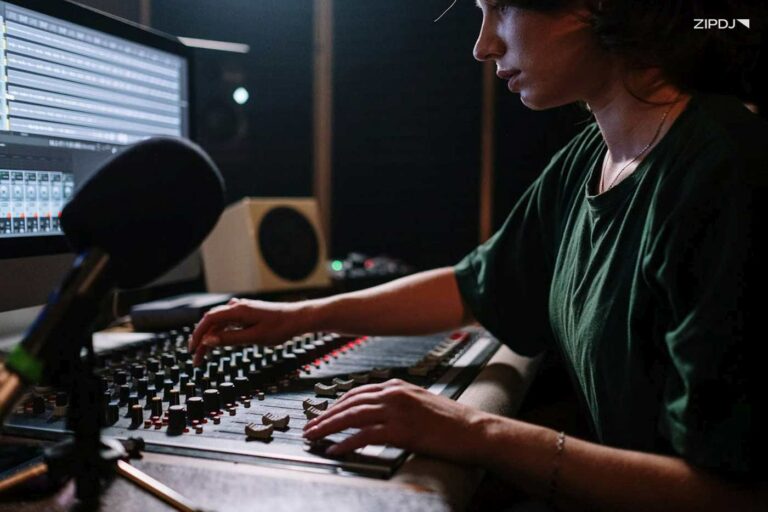How Much Do Music Producers Make? A Detailed Guide

Becoming a music producer is an increasingly popular career choice for musicians and DJs, and there are many opportunities for expanding revenue streams.
The scope for increasing your average salary is broad, from producing original tracks and remixes for other artists to generating passive income on streaming services.
In this guide, we’ll break down the various types of music producers and how much money you can earn based on the available revenue streams.

What Is A Music Producer?
Becoming a music producer involves a broad range of activities, whether working independently on niche genres or collaborating with successful artists in the music industry.
The role involves working closely with other artists to establish the tone and style of a track, ensuring the finished product is polished and professional.
A professional music producer addresses all aspects of songs, including vocals, percussion, and other instruments, to create a balanced final mix.
The top music producers will also advise on which tracks to release as singles, how to increase radio play time, and work with journalists to improve commercial success.
So how much do music producers make for their efforts, and what can aspiring music producers do to increase their exposure and improve revenue potential?
A music producer’s income varies depending on several factors, including their track record, experience with major companies, and chosen genres.
It’s a popular way for DJs to expand their career in the music industry, including their music production background when compiling a DJ resume.
Find out more about a ZIPDJ subscription.
Types Of Music Producers
Whether you’re looking at ways to make money as a DJ or a dedicated music producer, there are different ways you can apply your skills in a professional capacity.
Here’s a brief overview of the different types of music producers to help you decide which approach is best for your career:
- Electronic music producers: Electronic music production is perhaps the most prevalent variation on the skill due to the popularity of electronic music genres and the accessibility of the software needed to start making tracks.
- Mixing engineers: Music producers with more experience often work as mixing engineers, which requires expensive equipment, a solid grasp of sound design, and the ability to manage recording sessions for artists and bands.
- DJ Producers: Many of the most famous DJs are known for producing high-quality music that complements their DJing style, with a built-in audience and the ability to test their new releases in a club setting.
- Soundtrack music producers: While some producers work independently, other music producers collaborate with movie and television productions to provide soundtracks to their content and require a grasp of visual editing to ensure the music fits the imagery.
Some music producers work directly with a specific record label, while others function on a freelance basis and offer their skills to a broad range of artists.
There is no limit on what type of music production you can engage in, and the stronger a producer’s reputation, the more job opportunities they have.
How Music Producers Get Paid
Music production is a great way to stay relevant as a DJ, showcase your style, and gain a chance to break into the music industry.
Whether you’re considering launching your own music production career or curious to learn how much music producers make, we’ve got the answers you’re looking for.
1. Upfront Fees
One of the most common and reliable forms of income for music producers is an upfront fee, which represents a one-time payment for their work.
This flat fee will vary depending on the content produced, such as a full song or a song’s remix, and will increase based on the music producer’s experience.
Newcomers to music production might command an upfront fee of between $200 and $400 per song, while established producers earn much higher fees.
For instance, a mid-level producer for a record label might expect a fee of around $2,000 to $3,000 per song, with a much higher fee for the top music producers.
The hip-hop producer Dr. Dre has amassed a net worth of approximately $400 million, while the iconic rock music producer Rick Rubin has a similar pedigree and income.
Sign up for a ZIPDJ subscription today.
2. Selling Sample Packs
If you’re an entry-level music producer looking for a passive income on the side, selling sample packs is a viable option for consistent revenue.
Sample packs can be produced while working on original tracks. The drums, loops, synths, and other elements are then combined into the pack.
They can be sold through dedicated organizations or directly to producers and DJs on social media platforms, with sample packs often tailored to specific music genres.
Music producers can also pair sample packs with other resources for other music producers, such as production courses and plugins for digital audio workstations.
3. Digital & Physical Media Sales
While physical media such as vinyl records and CDs aren’t as popular as in the 1990s, many producers make a good income from limited edition releases.
With streaming services swamped with competitors, CDs and records are a great way to get your music heard and build a loyal following of fans.
Exclusivity and the appeal of well-designed packaging make them collectible items for music lovers, particularly when released in limited edition runs.
They’re also a great way to increase revenue from live events, setting up a stall to sell records, CDs, and other merchandise, such as clothing and stickers.
Profit margins on physical media sales can vary depending on the scope of the print run and distribution costs, offering the potential for continuous revenue streams.
Learn more: Find out everything you need to know to navigate the DJ industry.
4. Live Events
Music producers who master the art of DJing and the performance skills associated with the medium can earn significant sums through live events.
Live production events can be held at small but dedicated underground clubs, and the earning potential is around $500 to $1000 per event.
On the higher end of the spectrum, influenced by a producer’s reputation and global reach, event payments can reach $100,000 and above for a significant headlining gig.
Alternatively, music producers can earn money by working on live events for other artists, helping to establish the event’s program, and managing audio production.
In this case, many music producers work on a salaried basis, with an entry-level salary beginning around $25,000 and rising based on experience and venues.
The role is sometimes listed as an Event Producer, and there can be some cross-over between music production roles and general event management duties.
5. Streaming Services Royalties
With the rise of social media and music being pivotal to gaining exposure, building a fan base, and selling music, streaming services have played an increasingly important role.
Music producers can increase their revenue through royalties on platforms such as Spotify, Apple Music, Amazon Music, and Tidal.
These services have continued to face controversies for the low payment rates per stream and the necessity for millions of streams to match the US minimum wage.
That said, music producers who incorporate these into a multifaceted approach to generating an income stream can still benefit from them.
Revenue generation might be limited, but the platforms provide opportunities for promoting events, merchandise, and other income sources.
Music producers working for established artists such as Taylor Swift can include streaming royalties alongside other income sources, such as payment for studio time.
This revenue can be anywhere between 2% and 50%, depending on their experience, offering an additional source of passive income for months or even years.
Recommended: Discover the best music conferences to attend.
6. Mechanical Royalties
Mechanical royalties are another common method for music producers to earn money through registration with a publishing admin company.
Music producers earn mechanical royalties each time a song they have produced is performed in a public setting, such as a festival or other event.
This can sometimes be rolled into streaming royalties, although such royalties can be unpredictable and are occasionally fraught with controversies.
Fortunately, there are professional organizations, such as PRO, that music producers can work with to ensure their royalties are as high as possible.
These organizations take a percentage cut of mechanical royalties, with the music producer receiving the rest through regular payments.

7. Remix Music Production
Many producers make additional income through the art of remixing, which involves taking an established piece of music and reworking it into a new track.
The earning potential for remixes can vary wildly, depending on factors such as the public profile of the original artists and the remixer’s track record.
Some of the best DJ remixes have become massive hits in their own right, earning large sums for the original recording artist and remixing producer.
Earnings for commissioned remixes can pay a flat fee of between $50 and $10,000, rising to as much as $100,000 for remixes for major artists.
Newcomers to music production might work on remixes for free to build their reputation and portfolio or enter contests to gain industry attention.
Once a remix has been produced, it can generate revenue streams through YouTube video views and is a great resource for building a following on social media.
Explore these glowing member testimonials for ZIPDJ.
8. Publishing Royalties
Another popular, industry-standard method for music producers to earn money is publishing royalties, which are based on music sales.
Publishing royalties are determined in advance, with a predetermined portion of profits from physical and digital media sales going to the music producer.
The more established a music producer is, the greater their ability to demand a more significant cut of these profits based on their contract with a label.
These royalties apply to singles, EPs, and albums, and music producers typically command 2 to 5% of generated revenue.
Additional income can also be gathered if DJs pay royalties for music in their sets, mainly when DJing on radio shows.
9. Mixing & Mastering
One of the most challenging aspects of music production that can result in impressive earning potential is through mixing and mastering.
The ability to mix down a track and master it ready for public consumption requires extensive experience and an expensive, dedicated studio setup.
While there are options for affordable mixing and mastering rigs, professional-level studios spend large sums of money on speakers, mixing desks, and other hardware.
As such, music producers who can provide this equipment and have the knowledge to use it to their full advantage can earn upwards of $50,000 to $100,000 per year.
This income can significantly increase when applied to film scoring or working at major companies such as EMI and Warner Music.
Related skills, such as working as a sound mixer or mastering engineer, also have high potential salary ranges for producers with relevant experience.
Read more: Land your next gig with this DJ proposal template.
10. Licensing Deals
Lastly, music producers can increase their income by licensing their tracks in films, television shows, or advertising.
Some of the world’s highest-paid DJs have achieved success by licensing productions for ads and use as background music in other media.
Often referred to as sync licensing, such deals aren’t always predictable, but they can potentially bring in huge sums of money if successful.
When used in a mix-and-match approach to revenue generation, licensing deals for other industry requirements can prove to be exceptionally lucrative.
The approach also has the advantage of allowing artists to connect with other creators and reach a new audience of potential clients and fans.
While inexperienced producers with limited discographies might find it hard to get such deals, established music producers can incorporate this into their revenue strategies.
Explore ZIPDJ’s competitive pricing.
Summary
Becoming a music producer and navigating the industry can be a considerable challenge, with many factors to consider that can impact your future royalties.
This article has provided a great starting point for applying your skills to reach out to potential clients and bring in an annual income for a full-time living.
As your portfolio and list of clients expands, the more job opportunities you can explore, the more you can reach out to major labels and develop a lasting career.
Not a member ?
Join Today for Unlimited Music Downloads. Visit zipdj.com for more information.



